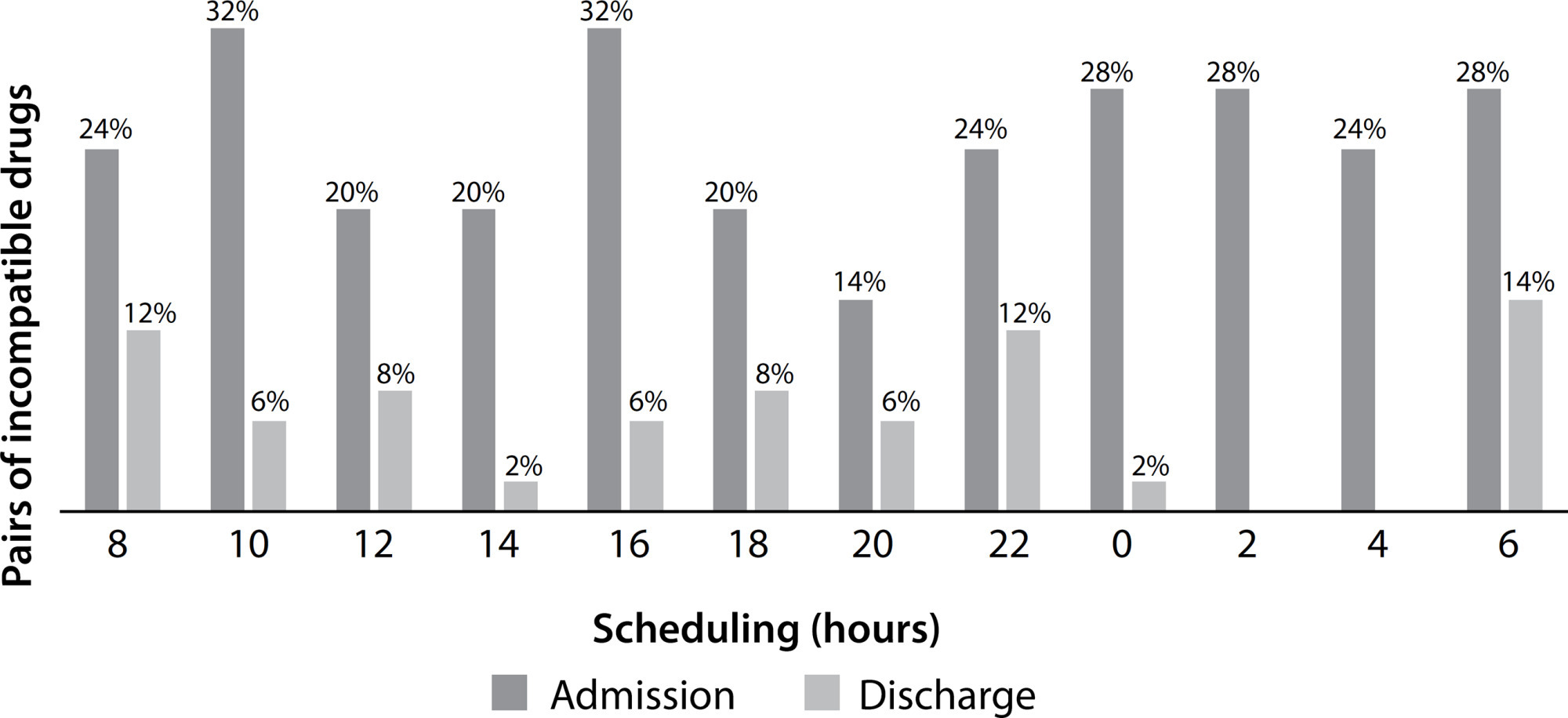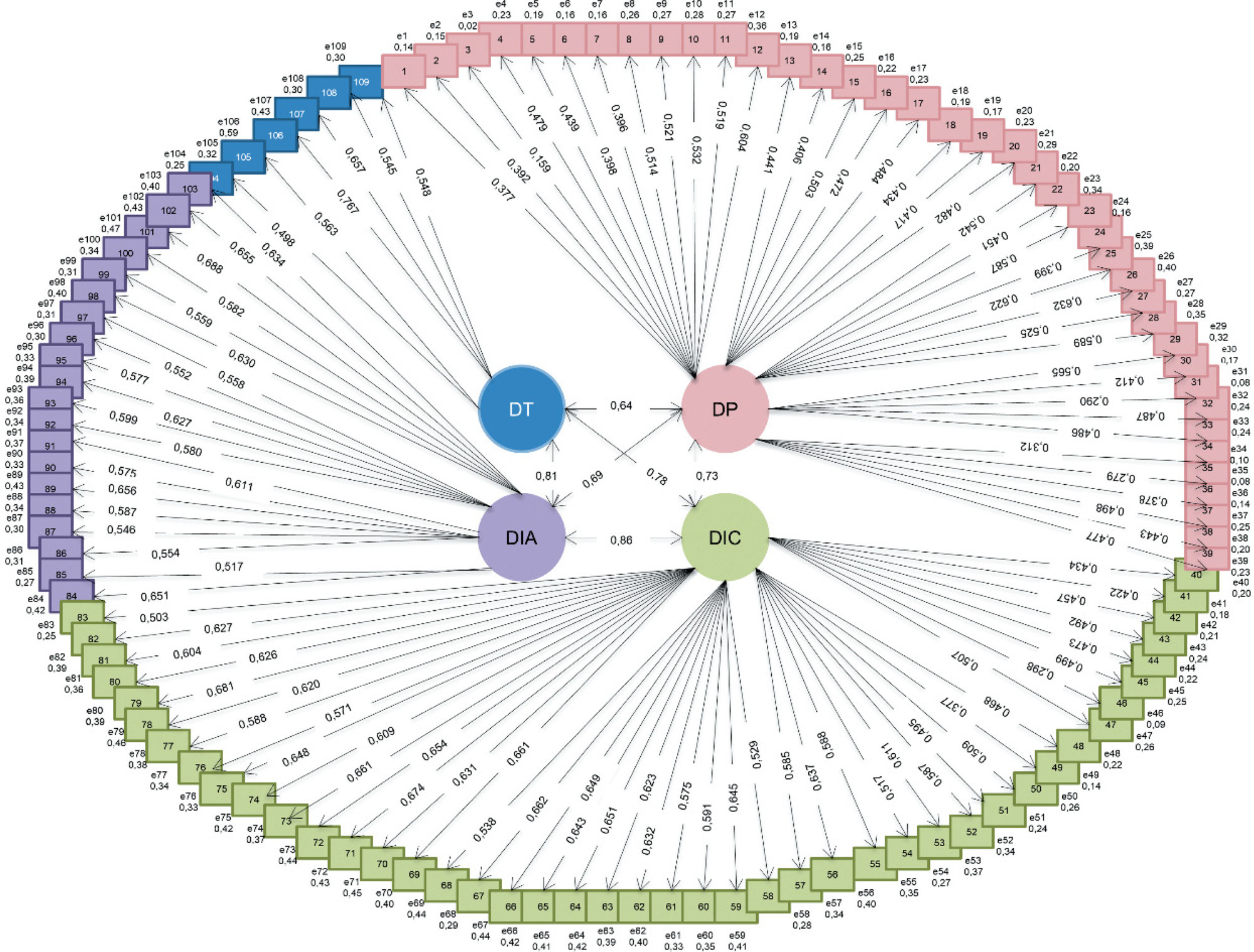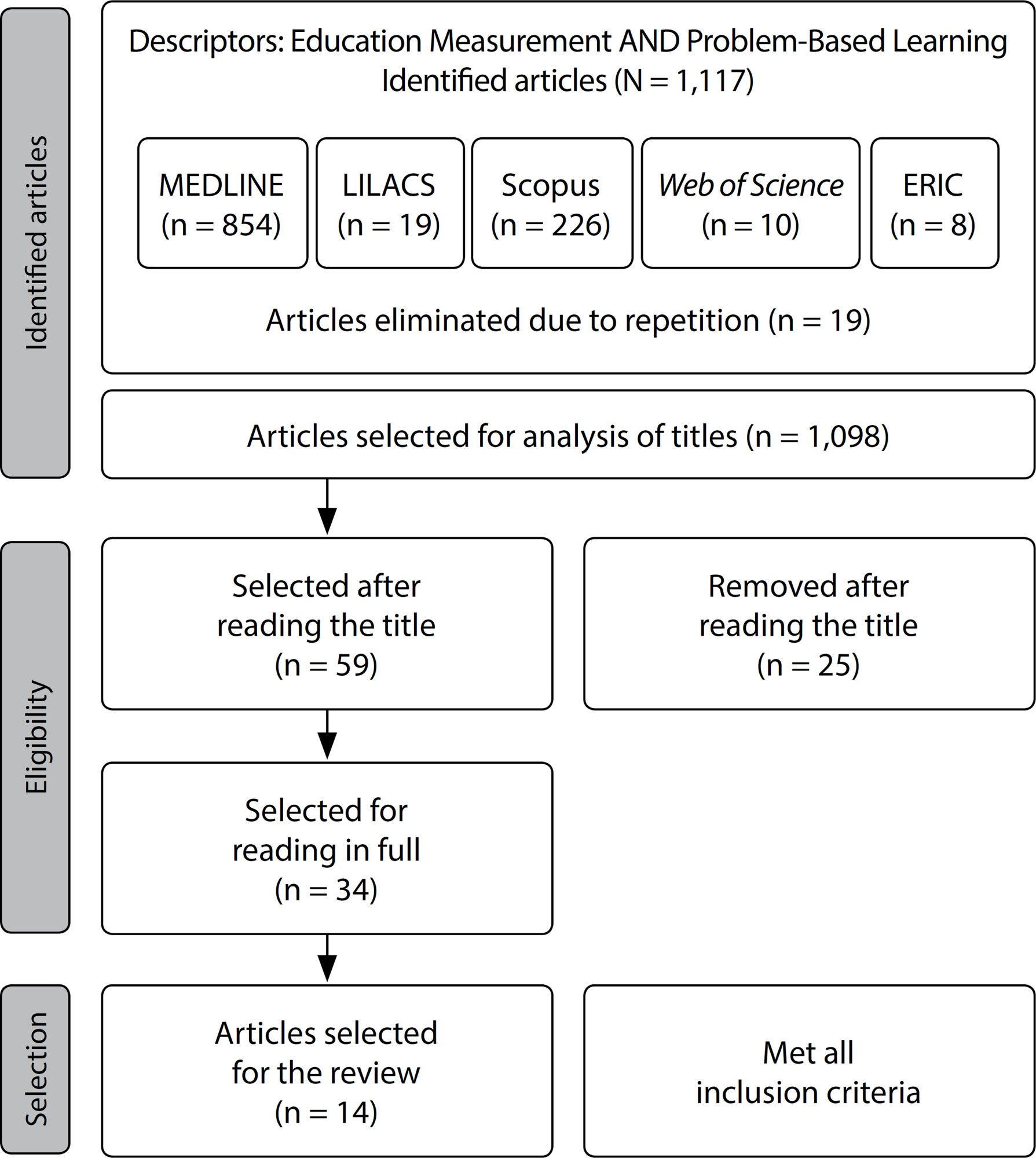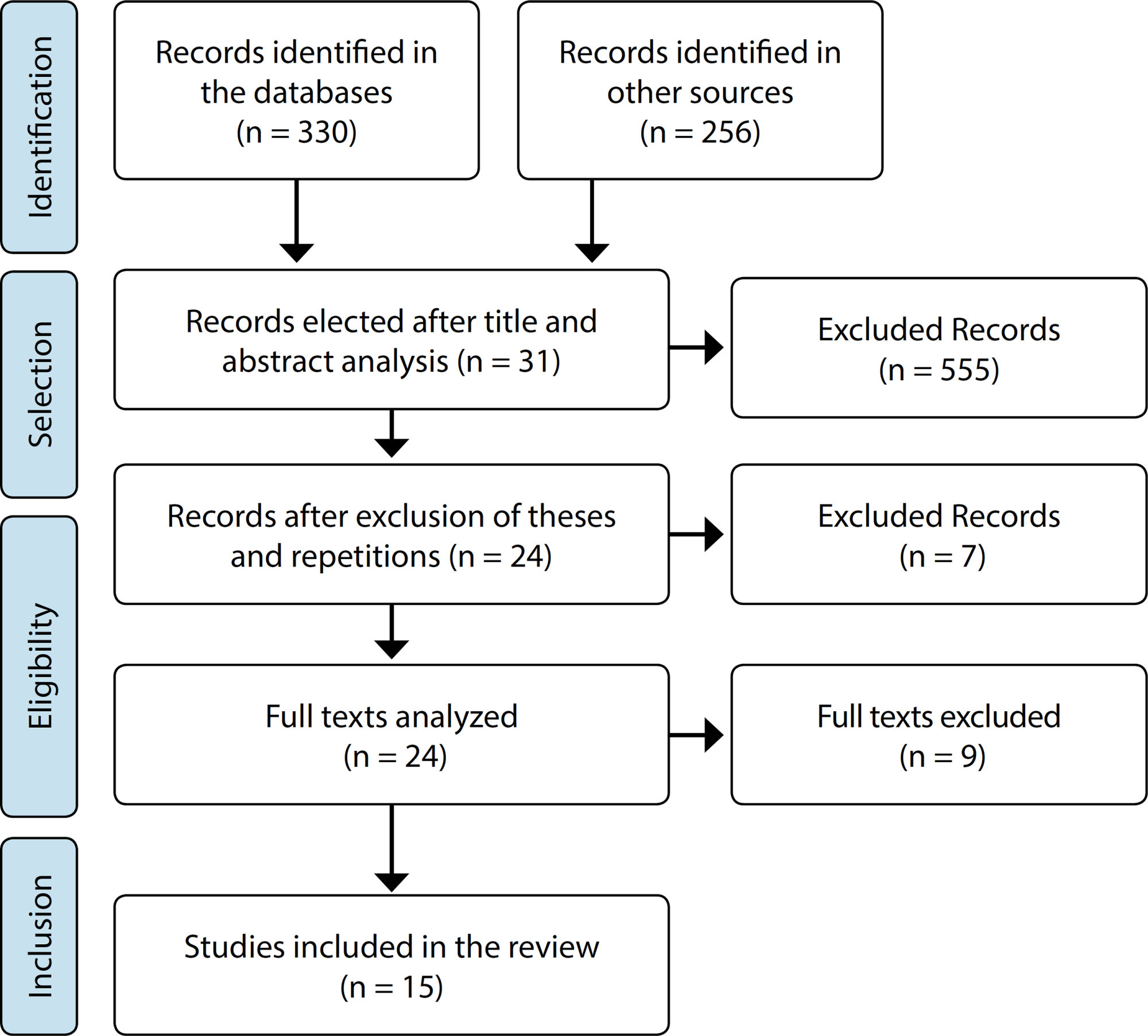-
REVIEW01-01-2018
Health promotion programs in higher education: integrative review of the literature
Revista Brasileira de Enfermagem. 2018;71:1714-1723
Abstract
REVIEWHealth promotion programs in higher education: integrative review of the literature
Revista Brasileira de Enfermagem. 2018;71:1714-1723
DOI 10.1590/0034-7167-2016-0693
Views0See moreABSTRACT
Objective:
to characterize the interventions of health promotion programs implemented in Health Promoting Universities; to analyze the results of the interventions of health promotion programs.
Method:
integrative review carried out in EBSCO, PubMed, SciELO, Scopus and Web of Science. Articles published between 2000 and 2014 were selected, with evidence of health promotion intervention programs and evaluation of results. Results: 17 articles were included. The health promotion programs aimed at increasing the welfare of students, with an emphasis on physical activity, sexual health and on improving the environment of health support within the university community.
Conclusion:
health promotion strategies in an university context do not always result from the convergence between educational, political, legislative or organizational actions that support lifestyles and conditions which are favorable to the health of individuals or groups, and that contribute to improving the physical and social environment.
PlumX Metrics
- Citations
- Citation Indexes: 24
- Usage
- Full Text Views: 6016
- Abstract Views: 404
- Captures
- Readers: 112

-
RESEARCH01-01-2018
Contraceptive behavior of Portuguese higher education students
Revista Brasileira de Enfermagem. 2018;71:1706-1713
Abstract
RESEARCHContraceptive behavior of Portuguese higher education students
Revista Brasileira de Enfermagem. 2018;71:1706-1713
DOI 10.1590/0034-7167-2017-0623
Views0See moreABSTRACT
Objective:
To characterize the contraceptive practices of higher education students and to identify factors that contribute to the use of different contraceptive methods.
Method:
A cross-sectional, descriptive correlational study was carried out with a sample of 1946 students, with a mean age of 21 years (20.74±2.32), who attended courses at a University in the North of Portugal.
Results:
Of the factors studied, the female gender, younger ages, previous behavior of condom use, knowledge about contraception, attitude and self-efficacy for condom use were associated with safer contraceptive choices.
Conclusion:
Investing in sexual education for young people is an important public health strategy that can empower youth to make more appropriate choices and improve adherence to contraceptive methods, reducing the risk of unintended pregnancies and sexually transmitted diseases.
PlumX Metrics
- Citations
- Citation Indexes: 9
- Usage
- Full Text Views: 2587
- Abstract Views: 190
- Captures
- Readers: 101
-
RESEARCH01-01-2018
Nursing and Global Health: social determinants of health in the training of nurses
Revista Brasileira de Enfermagem. 2018;71:1700-1705
Abstract
RESEARCHNursing and Global Health: social determinants of health in the training of nurses
Revista Brasileira de Enfermagem. 2018;71:1700-1705
DOI 10.1590/0034-7167-2017-0631
Views0See moreABSTRACT
Objective:
To evaluate to which extent nursing professors understand how social determinants of health impact on health, and whether the topic is addressed in nursing undergraduate education in Brazil.
Method:
This is a methodological study carried out with 222 nursing faculty members from Brazilian higher education institutions. The answers of the domain “Social and environmental determinants of health”, concerning a questionnaire on “Core Competencies in Global Health”, were analyzed.
Results:
Most professors have over 10 years of experience in nursing higher education. A large part of the participants strongly agreed or agreed on the importance of college subjects related to the above-mentioned topic for the education of the nurses.
Conclusion:
The professors in this study agreed that social and environmental health determinants must be taught in Nursing school, since it is necessary that nurses value this knowledge, slowly making it a part of the curriculum framework.
PlumX Metrics
- Citations
- Citation Indexes: 6
- Usage
- Full Text Views: 3517
- Abstract Views: 184
- Captures
- Readers: 70
-
RESEARCH01-01-2018
National Licensure Exam for Brazilian Nurses: why and for whom?
Revista Brasileira de Enfermagem. 2018;71:1692-1699
Abstract
RESEARCHNational Licensure Exam for Brazilian Nurses: why and for whom?
Revista Brasileira de Enfermagem. 2018;71:1692-1699
DOI 10.1590/0034-7167-2017-0929
Views0See moreABSTRACT
Objective:
To analyze critically the reasons for regulating a National Licensure Exam for Brazilian Nurses (NLEXB-N).
Method:
Qualitative study with secondary source applying the critical discourse analysis to situate context and intertextuality in the establishment of a new social practice. We analyzed data from legal documents regulating the National Licensure Exam of other professions in Brazil, the Educational Census, the Survey of Brazilian Nursing Profile and global nursing literature.
Results:
Four themes were explored: Brazilian experiences with this exam; nursing experiences in other countries; effects of the exam on the examinees; NLEXB-N in Brazil: what purposes could we present?
Final considerations:
The National Licensure Exam for Brazilian Nurses is a measure of individual accountability that increases social injustice, inequality and inequity. We must pay attention to the consequences of its application, based on evidences produced in the area.
PlumX Metrics
- Citations
- Policy Citations: 1
- Citation Indexes: 2
- Usage
- Full Text Views: 3410
- Abstract Views: 766
- Captures
- Readers: 38

-
RESEARCH01-01-2018
North American nurse educators in the HOPE Earth Project and Nursing teaching
Revista Brasileira de Enfermagem. 2018;71:1685-1691
Abstract
RESEARCHNorth American nurse educators in the HOPE Earth Project and Nursing teaching
Revista Brasileira de Enfermagem. 2018;71:1685-1691
DOI 10.1590/0034-7167-2017-0825
Views0See moreABSTRACT
Objective:
analyze the activities of the North American nurse educators of the Project Health Opportunity for People Everywhere Earth (HOPE Earth Project) in Natal, state capital of Rio Grande do Norte, Brazil (1974-1981).
Method:
sociohistorical, qualitative study, resulting from filed documents and ten semistructured interviews. These sources were processed and analyzed using Oral History and Thematic Analysis.
Results:
the following categories emerged: The North American nurse educators of the HOPE Earth Project and Educator Mary Anne Small through the memories of who had contact with her.
Final considerations:
the HOPE Earth Project contributed to higher education in health at the Federal University of Rio Grande do Norte, guaranteeing the coming of qualified and experienced lecturers, and the North American educators cooperated towards the qualification of the Nursing Course, even when it was already structured and fully functioning.

-
RESEARCH01-01-2018
Teachers’ experiences about first aid at school
Revista Brasileira de Enfermagem. 2018;71:1678-1684
Abstract
RESEARCHTeachers’ experiences about first aid at school
Revista Brasileira de Enfermagem. 2018;71:1678-1684
DOI 10.1590/0034-7167-2017-0715
Views0See moreABSTRACT
Objective:
To unveil the experiences of primary and elementary school teachers about first aid at school.
Method:
a descriptive, qualitative study, conducted in May 2014, from a focus group with nine teachers from the municipal network of Bom Jesus-PI. Audio recording occurred, content was transcribed, and data were processed by IRAMUTEQ software and analyzed from the Descendant Hierarchical Classification.
Results:
Three classes were obtained: Teachers’ knowledge about first aid (influence of maternal experience, belief in popular myths and awareness of lack of preparation were indicated); Feelings in situations of urgency and emergency (anguish, fear and concern); First aid at school, (occurring in class or during break time, coming from collisions and syncope).
Final considerations:
The research evidenced experiences based on popular beliefs, family experiences and knowledge gaps. The lack of preparation was evidenced by the teachers’ reports about having misconduct during first aid at school.
PlumX Metrics
- Citations
- Citation Indexes: 10
- Usage
- Full Text Views: 9508
- Abstract Views: 516
- Captures
- Readers: 102
- Mentions
- News Mentions: 1

-
RESEARCH01-01-2018
Problematization methodology in primary healthcare teaching
Revista Brasileira de Enfermagem. 2018;71:1671-1677
Abstract
RESEARCHProblematization methodology in primary healthcare teaching
Revista Brasileira de Enfermagem. 2018;71:1671-1677
DOI 10.1590/0034-7167-2017-0157
Views0See moreABSTRACT
Objective:
To identify the contribution of the problematization methodology in primary healthcare teaching in a nursing undergraduate course.
Method:
Documentary, descriptive and qualitative study, carried out with undergraduate students from the Ribeirão Preto College of Nursing at the University of São Paulo. Data were collected through analysis documents which consisted of 21 evaluation forms filled out by first-year undergraduate students in the 2013 school year taking the subject Comprehensive Health Care I, whose theoretical framework was focused on primary health care.
Results:
It was found that the subject met the intended goals, allowed coordination between theory and practice, and enabled the contact of undergraduate students with the profession and work environment in the beginning of the course.
Final considerations:
Analysis of the evaluation forms for the subject Comprehensive Health Care I evidenced that the use of the problematization methodology favored primary healthcare teaching.
PlumX Metrics
- Citations
- Citation Indexes: 4
- Usage
- Full Text Views: 2339
- Abstract Views: 183
- Captures
- Readers: 38
-
RESEARCH01-01-2018
Nursing students facing moral distress: strategies of resistance
Revista Brasileira de Enfermagem. 2018;71:1663-1670
Abstract
RESEARCHNursing students facing moral distress: strategies of resistance
Revista Brasileira de Enfermagem. 2018;71:1663-1670
DOI 10.1590/0034-7167-2017-0072
Views0See moreABSTRACT
Objective:
To understand the resistance strategies adopted by undergraduate students in nursing, faced with situations of moral distress (MD).
Method:
Qualitative research, developed in three universities in the south of Brazil, two federal and one private, with 21 undergraduate students in nursing from December 2015 to February 2016; the data was submitted to the discursive textual analysis and Foucauldian theoretical reference.
Results:
Students resisting demonstrate a sense of self-preservation and moral empowerment. Moreover, non-resistance initiatives are related to the fear of possible sanctions. Thus, by resisting or not, students may experience both positive and negative repercussions.
Final considerations:
By resisting, students aim to defend what they believe to be right, demonstrating their moral empowerment in the face of their moral distress. However, the exercise of disciplinary power seems to contribute to their moral fragilization, making it difficult to implement resistance strategies.
PlumX Metrics
- Citations
- Citation Indexes: 14
- Usage
- Full Text Views: 2029
- Abstract Views: 185
- Captures
- Readers: 76

Search
Search in:
Nuvem de Tags
Enfermagem (930)Cuidados de Enfermagem (269)Atenção Primária à Saúde (239)Idoso (208)Educação em Enfermagem (151)Segurança do Paciente (150)Saúde Mental (145)Educação em Saúde (139)Estudos de Validação (131)Qualidade de Vida (104)Tecnologia Educacional (100)Promoção da Saúde (99)COVID-19 (91)Criança (91)Família (87)Enfermagem Pediátrica (86)Saúde do Trabalhador (86)Adolescente (85)Saúde Pública (82)Estudantes de Enfermagem (77)











